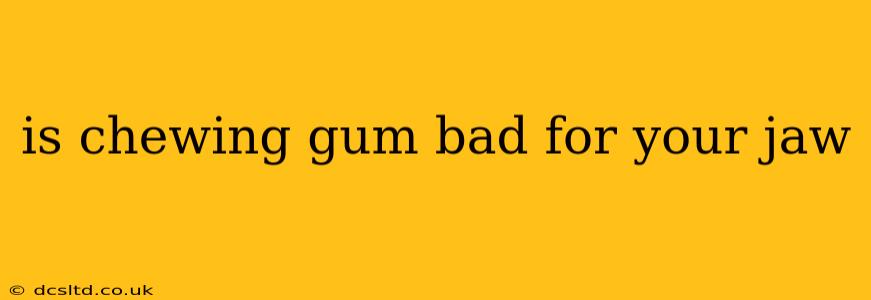Chewing gum is a popular pastime enjoyed by many, offering a refreshing sensation and a potential aid for focus and stress relief. However, concerns have arisen regarding its potential impact on jaw health. This article delves into the evidence to determine whether chewing gum is genuinely detrimental to your jaw. We'll explore the potential benefits and drawbacks, addressing common questions and concerns.
Can Chewing Gum Cause TMJ?
This is a frequently asked question. Temporomandibular joint (TMJ) disorders involve the joints connecting your jaw to your skull. While chewing gum isn't definitively proven to cause TMJ, excessive or forceful chewing can exacerbate existing conditions or contribute to their development in susceptible individuals. The repetitive stress placed on the jaw joints through vigorous chewing can lead to inflammation, pain, and clicking or popping sounds. Individuals with pre-existing TMJ problems should exercise caution and potentially limit their gum chewing.
Does Chewing Gum Strengthen Your Jaw Muscles?
Moderate chewing can, in fact, provide a mild workout for your jaw muscles, potentially leading to increased strength and endurance. Think of it like a light resistance exercise. However, this benefit is only realized with moderate chewing. Excessive force or prolonged chewing sessions can negate any positive effects and lead to strain and potential injury.
Can Chewing Gum Damage Your Teeth?
While chewing gum itself doesn't directly damage teeth, certain factors related to gum chewing can. The act of chewing can exacerbate existing dental problems like bruxism (teeth grinding). Additionally, many gums contain sugar, which contributes to cavities. Sugar-free gum is generally preferred to mitigate this risk. Furthermore, excessively forceful chewing can wear down tooth enamel over time.
Is Sugar-Free Gum Better for Your Jaw?
Yes, sugar-free gum is generally considered a better choice for jaw health. Avoiding sugar reduces the risk of cavities, a dental problem that can indirectly impact jaw health through potential infection or the need for extensive dental procedures. However, even sugar-free gum should be chewed in moderation to avoid excessive strain on the jaw.
How Much Chewing Gum is Too Much?
There's no definitive "safe" amount of gum chewing. It largely depends on individual factors such as existing jaw conditions, chewing intensity, and overall oral health. However, listening to your body is key. If you experience jaw pain, fatigue, or discomfort after chewing gum, it's a sign to reduce your intake or cease chewing altogether.
What are the Alternatives to Chewing Gum?
For those seeking a similar sensory experience without the potential risks associated with chewing gum, consider alternatives like:
- Sugar-free hard candies: These offer a similar oral stimulation without the intense chewing action.
- Jaw exercises: Targeted exercises can strengthen jaw muscles without the potential strain of chewing gum. Consult a physical therapist or dentist for recommendations.
- Stress-reduction techniques: If you chew gum primarily to manage stress, consider exploring alternative techniques like meditation, yoga, or deep breathing exercises.
Conclusion:
Chewing gum, in moderation and with awareness, isn't necessarily harmful to your jaw. However, excessive or forceful chewing can contribute to jaw problems, especially for those with pre-existing conditions. Choosing sugar-free options and paying attention to your body's signals are crucial steps in ensuring that your gum-chewing habit remains a harmless enjoyment rather than a source of dental or jaw problems. If you have concerns about your jaw health, consult with a dentist or other healthcare professional.
